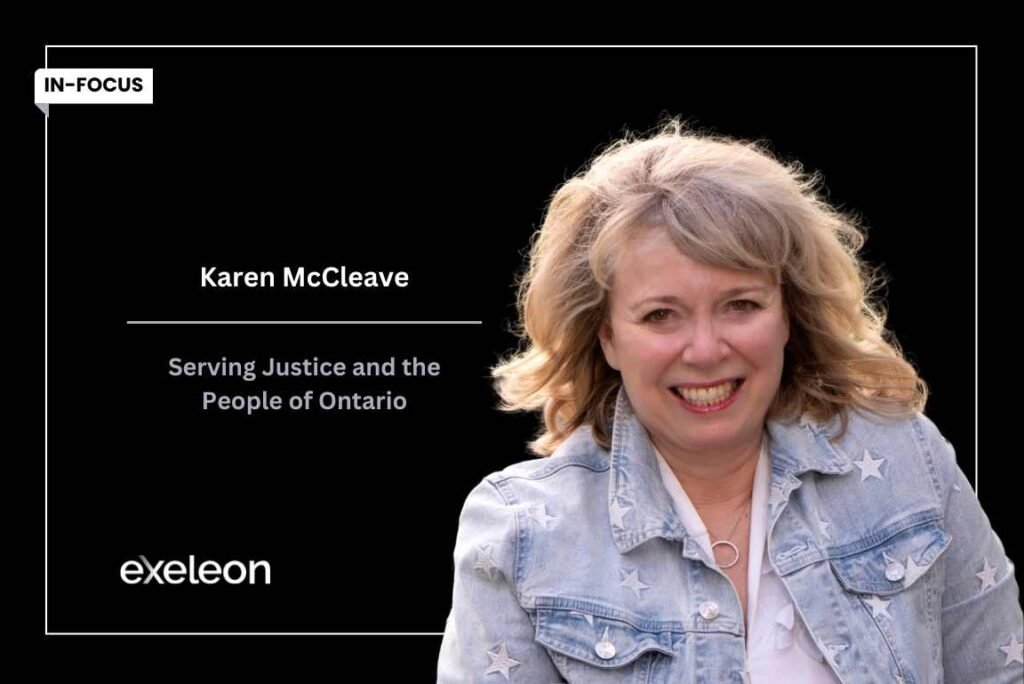For more than three decades, Karen McCleave was a part of Ontario’s justice system in prosecuting a varied and challenging array of cases, including murder, domestic assault, sexual and child abuse and complex fraud. She conducted countless jury trials.
She had responsibility for many high-profile and sensitive matters, some involving victims with intellectual and physical challenges. Karen managed a Satellite Court, served as the Crown representative on stakeholder committees, established Ontario’s first integrated Case Administration Unit, and supervised a newly created prosecution office for the Region of York.
Karen McCleave taught and trained many other legal professionals. She was a designated wiretap agent and provincial mentor for sexual violence prosecutions.
In recognition of her accomplishments, she received the Doug Lucas Award “for excellence in the pursuit of justice through science”, as well as two Ontario Excelsior Awards, both for Outstanding Achievement.
After her work in the Crown’s Office, Karen broadened her scope of civic engagement, serving as a policy advisor to a Senator in Ottawa. She is in her second term as a member of the Justices of the Peace Appointments Advisory Committee (JPAAC). Karen is a Board Trustee at the McMichael Canadian Art Collection, where she chairs the Governance and Nominating Committee.
For our readers outside Canada, what role does a Crown Attorney play in the criminal justice system?
Karen McCleave: Criminal law is under federal jurisdiction; the Criminal Code of Canada applies across the land. That said, the provinces and territories administer it, so I worked for the Attorney General of Ontario. A crime is considered one against the community, so the Crown Attorney prosecutes it on behalf of society. Crowns are considered to be quasi-judicial officers because of their responsibilities and powers. For example, each case is assessed as to whether it should go to trial. If it doesn’t meet a certain threshold, the Crown withdraws it. Once it proceeds, the Crown is involved in a litany of steps, from initial disclosure responsibilities all the way to sentencing positions. Trials take a lot longer than on television shows! I had some murder cases that took many months to complete. It is hard work, with long hours and the need to juggle many balls simultaneously. That said, it is also extremely rewarding. It is humbling to recognize that the public trust rests on your shoulders and you carry the expectation to “get it right”. The Crown’s responsibility is to discharge its duties fairly and dispassionately, always balancing a myriad of considerations.
Based on your long career, what challenges to the court system did you experience?
Karen McCleave: Every criminal justice participant in Canada will tell you that the system is constantly struggling to address the large case backlog, as exacerbated by COVID. It is akin to trying to fit five pounds of volume into a one-pound jar! Our Supreme Court has laid out firm timelines about the length of time in which a case should be completed, which can result in the stacking of trials onto one docket. Delay hurts everyone. Victims struggle with the lack of resolution, memories fade, and accused people remain in custody or live with bail conditions.
That said, we have made some laudable strides in setting up dedicated mental health and other “special” courts, to lend specialized expertise and focus to certain aspects of offending and offenders. They didn’t exist when I started.
What was your most difficult case?
Karen McCleave: An impactful one involved street racing by three drivers on a major roadway that killed a truck driver and closed the highway. It was legally interesting, with party liability and other issues in interpreting a newly created offence. There were separate prosecutions, two of which went to the Court of Appeal on a myriad of issues. The victim’s spouse had intelligent insights that really galvanized the recognition that criminal driving offences can have the same impact as murder cases on those left behind.
As well, there were aspects of many trials that, upon recollection, coalesce into one big storm cloud! The most difficult are the ones with child victims who were sometimes pressured by a parent not to testify about the offending partner. This was particularly acute in incest cases. Other challenges are hostile witnesses. I had to visit a jail to interview an inmate who was a material witness in a murder case. Difficulty also arose in cases with thousands of pages and numerous recordings that had to be reviewed in real time. There is a sage saying that “good advocacy is 99% perspiration and 1% inspiration”. I perspired a lot! Each court day is navigated like a roller coaster where you buckle up and go for a ride. A multi-day trial can collapse into a plea; a two-hour trial can go on for days.
You’ve served the people of Ontario in government as an Assistant Crown Attorney, and through active involvement in nonprofits. What prompted a different focus on philanthropy and community engagement?
Karen McCleave: I have a servant’s heart. The joy and meaning of service has been the driver to take me down as many roads as possible. At a certain point in my career, I realized that I had ticked the boxes on my professional to-do list. I started to think about how to help in other capacities. My one pre-requisite was that new ventures, or adventures, had to continue to feed passion and purpose.
The natural way to do that is to pursue the causes that interest you, that are reflective of the things you value, and want your community to know more about. You need to figure that out. It was a journey. These days, I support many causes, prioritizing programs that deliver front-line services.
You are known for your wide and varied interests that extend far beyond the legal profession. Tell us about your involvement at the McMichael Canadian Art Collection.
Karen McCleave: I am drawn to creativity and culture. I believe that great works of art connect us to different eras, emotions, and stories. Importantly, art can be a magnet to bring communities together in joint appreciation of the wonder of our world. Being on the Board of Trustees at McMichael is a tremendous honour. I am always humbled to be in the presence of an artist’s vision that is shared with the viewer. It can be intimate and enlightening. The McMichael fuels my art appreciation, including the Group of Seven, Indigenous and Inuit paintings and sculpture, and current artists who are re-imagining and challenging how we define Canadian art. There is a duty to preserve and display this history and evolution, not only for the present, but for the generations that follow.
As an off-shoot, we are doing some exciting work with our Directors-In-Training program, engaging young adults without Board experience to acquire governance skills and become part of the Collection’s fabric. You quickly realize that the teacher can become the student, as I have learned so much from watching our DIT’s engage in what is meaningful to them in re-calibrating the present for the future.
How does your JPAAC work fit into this life chapter?
Karen McCleave: My committee work on JPAAC keeps me connected and contributing to the justice system. My experience is a good fit for this work, but again, I continue to learn. Justices of the Peace serve on a lay bench, so we see a vast array of applicants. I meet very interesting and talented people.
Recently you’ve begun racing thoroughbreds at Woodbine and Gulfstream Park in Florida. What led to this re-connection with your childhood affection?
Karen McCleave: I grew up with standardbred horses, so the attraction to horse racing must be in my DNA! As to why I’ve picked it up again after all these years – I had something of a personal revelation: This passion had never really left me, but I had suppressed it. I realized that by not exploring this thing that I loved, I’d been doing myself a disservice for too long. I made a decision to dive back into that world. My excitement can spill over. I have very indulgent family and friends who humor my incessant “horse talk”!
My racehorses have brought me on this incredible journey of discovery. They engage and excite me. My thoroughbred education has not been a learning curve, but a vertical line. My time in the barns is my happy space to enjoy these sentient animals, whose variety of personalities and abilities are present every day. They are a lovely puzzle to figure out!
Also Read:










